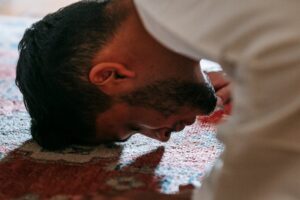Knowing God through His mighty names and attributes is the foundation for never feeling alone or lonely. Many people look to the social arena for the feeling of safety and security because when you are with family or friends or even strangers you feel a sense of tranquility. The famous Ibn Khaldun said: “The human is a social being in his original inclination.”
But how often do we experience loneliness even when we are among family or friends or other people? Worries, invading our minds and coming in waves, make us feel like we are disconnected from people we are sitting with! People may notice, and start to ask, “What’s wrong? Are you okay?” But sometimes it’s hard to share private worries or fears even with people you love and feel close to.
This is where one’s faith in God and trust in Him (SW) can sprinkle a mist of peace during moments of hardship that no one else can offer. It depends on one’s level of trust in the Qadr of Allah that helps us or impedes us to cope with life.
We can learn and take comfort from the multiple stories mentioned in the Quran and Sunnah describing the worries and even fear that prophets and the righteous ones experienced before us, and how they coped. Our beloved prophet (SAAW) described his worries after the people of Thaqeef sent their kids to throw stones at him saying: “I left unaware of my direction until I found myself at a place called Qarn Al-Tha’aleb, and then I noticed a cloud shading me.” We also know that he (SAAW) was not immune to human sadness or grief. He experienced grief and a feeling of loss that made him cry after the death of his son Ibrahim.
Moses spoke about his fear when God commanded him to go to Pharaoh to call him to submit to God, in this verse: {So send my brother Aaron with me as helper for he is more fluent than I with words, that he should affirm me, for I fear that they would call me a liar.} 28:34. Aisha (RAA) faced worry when false accusations were made against her virtue until God revealed verses in the Quran to exonerate her. The list of similar stories goes on and on.
Interestingly, with every hardship, worry, or fear, and when people feel they are beyond their limits to take any more, the Quran and Sunnah direct people to submit to Allah in the form of Dua or supplication!
After the incident of Thaqeef, the prophet (SAAW) made a beautiful, long Du’a that started by saying: “Oh, Allah, I appeal to You for the weakness in my strength, and my limited power, and the treatment of contempt and humiliation from people. To You, the most Merciful of all the Merciful ones, You are the Lord of the oppressed, and You are my Lord.”
After the loss of his son Ibrahim, he (SAAW) said: “Indeed, the eye shall shed tears; the heart shall be in sorrow and on your loss, O Ibrahim, we are in grief.”
After Moses was commanded to go to Pharaoh he said: {My Lord! Open for me my heart. And make easy for me my mission. And release the knot from my tongue, so they understand my words. And appoint for me a minister from my family: Aaron, my brother.} 20:24/30.
Du’a and supplications are moments of total reliance on Allah, seeking help for mental and spiritual support to give a person the ability to have strength and courage. Du’a becomes the reminder within our own realm to believe in ourselves and empower us to stand strong by the Will of God.
The prophet (SAAW) once entered the masjid and found the Sahabi Abu Umamah consumed with worry, complaining about his debts. The prophet (SAAW) taught him to say this Du’a every morning and evening: “O Allah I seek refuge with You from worry and grief, from incapacity and laziness, from cowardice and miserliness, from being heavily in debt and from being overpowered by (other) men.”
Du’a gives us the company of Allah (SW) with us. It also reminds us of what we need to say out loud with full faith in the One (SW) who can either change matters for us or give us the strength to be able to cope with our issues and worries with patience.
Knowing that you are not alone and that Allah (SW) is always with you is a form of Tawheed that puts you in a state of worship by just remembering that in your mind and heart. Allah (SW) said: {Or [ask them:] Who answers the one in distress when he cries out to Him and He lifts the affliction.} 27:62.
Life is a journey of worries and tribulations, but always remember that you are never alone for Allah is with you and can free you from such hardships. Remember God’s promise to us in Surat Al-Baqarah, {Allah burdens not a person beyond his scope…} 2:286. That means He has already given us the strength within ourselves to persevere. Keep your supplications alive and you will find peace in the company of Allah.
By Sh Kifah Mustapha




